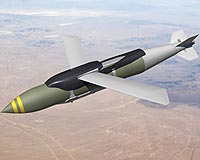| . |  |
. |
Tel Aviv, Israel (UPI) Mar 5, 2009 The two-year delay in the production of Lockheed Martin's F-35 Joint Strike Fighter and the cost increase this will entail could jeopardize a crucial deal with Israel for 75 of the stealthy fifth-generation fighter. The Israeli air force wants the aircraft as quickly as possible -- providing the price is right -- to counter the military threat it believes Iran poses through its alleged drive to acquire nuclear weapons and develop long-range ballistic missiles. The delay in the F-35 program announced Tuesday by U.S. Secretary of the Air Force Michael Donley is a major setback for the Israelis, whose long-range military deterrence rests largely on their air force's ability to strike at any of the Jewish state's adversaries. Donley said the high-profile F-35 won't be ready for operational deployment until 2015 instead of 2013. The Pentagon plans to buy 2,500 of the jets for the U.S. Air Force, U.S. Navy and U.S. Marine Corps over the next quarter-century at an estimated cost of $300 billion. Donley said that because of the F-35 delays, the Air Force is considering extending the operational life of the Lockheed Martin F-16. The Israeli air force may have to do the same for its fleet of advanced-model F-16I Sufas and Boeing F-15I Raams, which were custom-built to suit Israeli requirements. But the F-35 problems could mean that the upgraded F-15 Eagle, with radar-evading stealth capability, which Boeing has been touting as an alternative to the costly F-35 could find its prospects enhanced as far as Israel is concerned. Boeing says it can start delivering in 2011 at a cost of $100 million per jet, significantly undercutting Lockheed Martin on cost and delivery. One of the sticking points holding up an Israel deal on the F-35 has been the price. In 2008, the price per plane was around $200 million. Lockheed Martin said the final price would likely be considerably lower but with the two-year production delay that is problematical. Israel has been looking at a price of around $100 million per jet. Before Donley's announcement there were expectations that a compromise of $130 million was possible. As far as is known, the Israelis haven't formally approached Boeing. But the price and delivery dates for the upgraded F-15 fit in with their operational needs more than the F-35 and that could now swing a deal Boeing's way. Israeli officials have said the air force wanted to acquire an initial batch of 25 F-35s -- enough for one squadron -- in fiscal 2012, with an option on 50 more. Lockheed has suggested Israel might take 100 altogether. Another sticking point was the Israelis' insistence the F-35 be equipped with their own electronic warfare systems, as they did with the custom-built F-15I and F-16I aircraft they bought from Boeing and Lockheed Martin more than a decade ago. These currently constitute Israel's strategic air power and would have been largely replaced by the F-35 purchase. The Americans have balked at that demand but in November offered to cut the Israelis some slack if they concluded a deal within a few months. That may now be out of the window, if for no other reason than the Israelis, for operational reasons, may not be able to live with a two-year delay in the F-35 production schedule. The JSF is being developed by Lockheed Martin with eight foreign partners -- Australia, Britain, Canada, Denmark, Italy, the Netherlands, Norway and Turkey. Those countries are likely to get at least some of their F-35s before non-partner states, such as Israel, would. The Americans are extremely concerned that Israel will unleash unilateral pre-emptive air and missile strikes against Iran's nuclear infrastructure. Washington favors diplomacy and international sanctions to convince Iran to abandon its uranium enrichment efforts. It fears that an Israeli attack would ignite a wider regional war into which the United States would be dragged. Obviously, an Israeli air force with stealthy F-35s would suffer considerably fewer losses than if it employed its non-stealthy F-15Is and F-16Is. But whether the F-35 production delays will influence them and persuade them to stay their hand remains to be seen.
Share This Article With Planet Earth
Related Links The latest in Military Technology for the 21st century at SpaceWar.com
 Boeing Receives Contract For US Navy Direct Attack Moving Target Capability
Boeing Receives Contract For US Navy Direct Attack Moving Target CapabilitySt. Louis MO (SPX) Mar 04, 2010 Boeing has announced that it has been awarded an $11.4 million contract to supply Laser Joint Direct Attack Munitions (Laser JDAM) to meet the U.S. Navy's Direct Attack Moving Target Capability (DAMTC) requirement. The initial contract, which calls for the delivery of 23 munitions for testing and evaluation, is expected to lead to a production contract in 2011. With follow-on options, tota ... read more |
|
| The content herein, unless otherwise known to be public domain, are Copyright 1995-2010 - SpaceDaily. AFP and UPI Wire Stories are copyright Agence France-Presse and United Press International. ESA Portal Reports are copyright European Space Agency. All NASA sourced material is public domain. Additional copyrights may apply in whole or part to other bona fide parties. Advertising does not imply endorsement,agreement or approval of any opinions, statements or information provided by SpaceDaily on any Web page published or hosted by SpaceDaily. Privacy Statement |